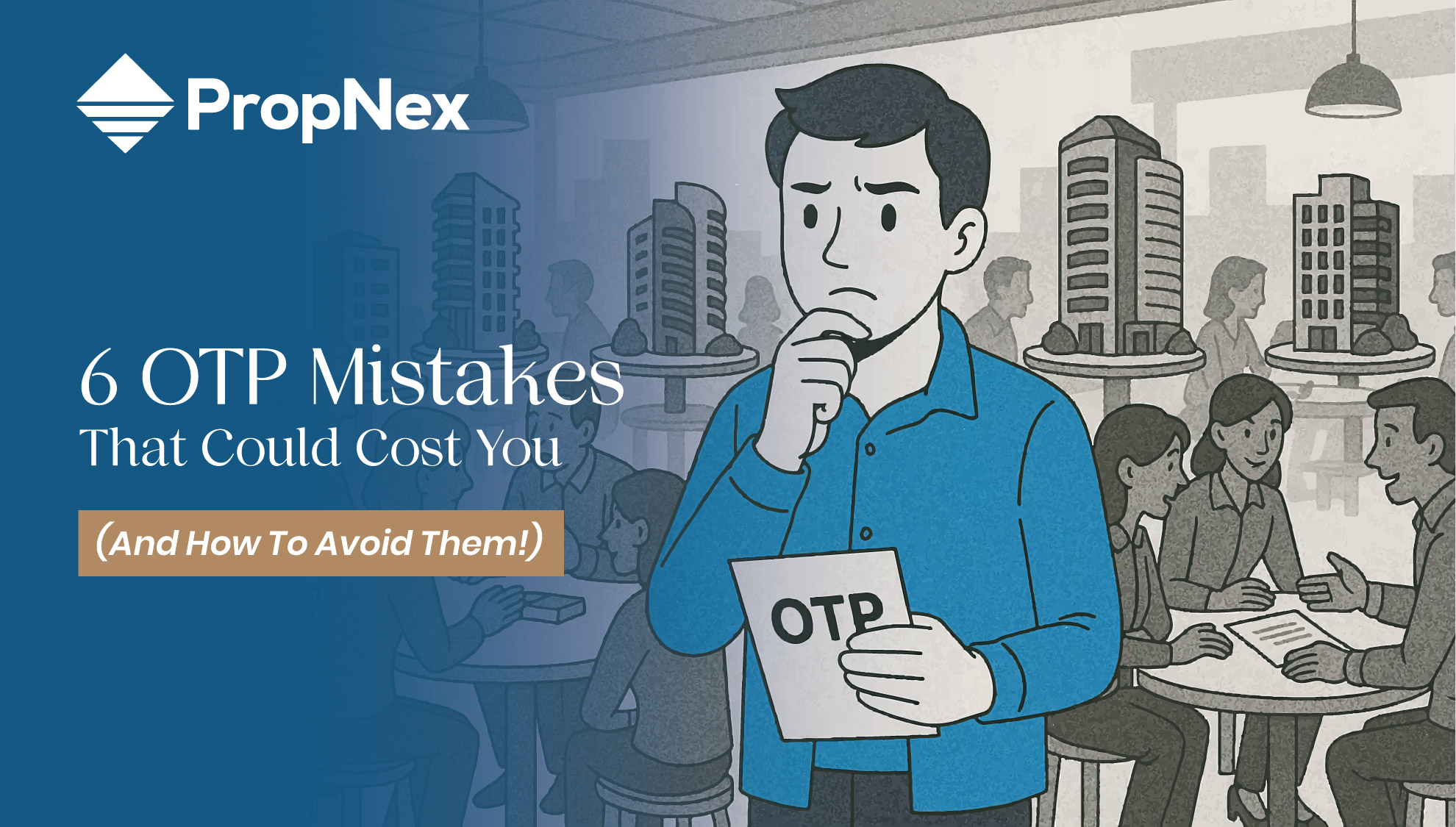PropNex Picks
|April 15,20256 OTP Mistakes That Could Cost You (And How To Avoid Them!)
Share this article:
So, you've found your dream home, and are presented with an option to purchase (OTP). It's tempting to sign on the dotted line immediately, fearing that someone else might swoop in and steal the property from under you. But wait - do you truly understand what you're committing to?
The OTP is a legally binding agreement, and one small mistake can lead to hefty financial losses or even losing the home entirely. Yet, many buyers - especially those buying their first home - rush into signing an OTP without realising the hidden pitfalls that could cost them thousands of dollars.
From missing deadlines to failing to secure financing, these blunders are more common than you think. But don't worry - we've got your back. In this article, we'll walk you through the six most costly OTP mistakes and, more importantly, how you can avoid them.
Read on to ensure you don't fall into these traps when securing your next property!
Many buyers mistakenly believe that signing an OTP is a casual reservation that can be easily withdrawn if they change their mind.
WRONG!
It's a legally binding agreement, and if you back out after signing, you'll forfeit the option fee - typically 1% of the property price for resale properties and 5% for new launch. That means for a $1,000,000 home, you could be waving goodbye to $10,000 or $50,000, just for a change of heart.
But it's not just about the buyer - sellers are affected too.
Once a seller grants the OTP, they're legally obliged to "reserve" the property for the buyer during the option period (14 days for resale, 3 weeks for new launches). They can't accept other offers or entertain new buyers.
How to avoid it:
Be 100% certain about your purchase before committing to an OTP.
Understand that the OTP is legally binding - it's not a 'just-in-case' reservation.
Always consult a property salesperson or lawyer if you're unsure about the terms before signing.
The OTP might seem like just another piece of paperwork in the home-buying process, but it's far more than that. Many buyers assume that once they have the OTP, they have all the time in the world to decide whether to proceed. BIG MISTAKE!
Once signed, it grants the buyer the exclusive right to purchase the property within a stipulated period - typically 14 days for resale properties and 3 weeks for new launches. If you fail to exercise the OTP (i.e., sign the Sale & Purchase Agreement and pay the deposit) within the stipulated date and time period, the option expires automatically and the seller keeps your option fee.
How to avoid it:
Mark the expiry date in your calendar and set reminders.
Act early - don't wait until the last day to exercise the OTP.
If you need more time, ask the seller for an extension in writing before the deadline (though they aren't obligated to grant it).
Signing an OTP before securing financing is like promising to buy a car without knowing if you can get a loan. Yet, many buyers make this mistake, assuming they can sort out their home loan after securing the OTP.
Here's the harsh reality: if your loan application gets rejected or you can't secure enough financing, you risk losing your option fee. Many buyers also just focus only on the purchase price and loan amount, forgetting about the extra costs that come with signing an OTP. These hidden expenses can add up to tens of thousands of dollars, catching unsuspecting buyers off guard.
Some of the major costs include:
Buyer's Stamp Duty (BSD): Up to 6% of the property price.
Additional Buyer's Stamp Duty (ABSD): Up to 60% for foreign buyers, as well as 20% and 30% for Singaporean investors buying their second and third or more property, respectively.
Legal fees: Typically between $2,500 to $3,500.
Valuation fees: Required by banks to determine loan amount eligibility.
Renovation and moving costs: Often overlooked but essential.
For a $1.5 million condo, your BSD alone could be around $44,600 - and that's before factoring in ABSD if applicable!
Banks assess various factors before approving a loan, including your credit score, existing debt, income stability, and Total Debt Servicing Ratio (TDSR). If you don't check these beforehand, you might realise too late that you can't afford the home or that you qualify for a smaller loan than expected.
How to avoid it:
Get an in-principle approval (IPA) from a bank before signing an OTP. This gives you a clear idea of how much you can borrow.
Factor in the Loan-to-Value (LTV) limit - you may not get the full 75% loan depending on your financial profile.
Check your credit standing to avoid unpleasant surprises.
Finding a property you love is exciting, but don't let emotions cloud your judgement. Some buyers rush to secure the OTP without conducting proper due diligence - only to discover later that the property has legal complications or structural defects.
For example, the property might have:
Outstanding property tax, maintenance fees, or legal encumbrances, which could delay the sale.
Structural issues, such as water leakage, pest infestations, or non-compliant modifications.
Once you've exercised the OTP, backing out means forfeiting your deposit.
How to avoid it:
Hire a lawyer to conduct legal checks on the property before signing the OTP.
Inspect the property thoroughly - check for signs of defects like cracks, leaks, or mould.
Request official documents, such as past renovation approvals or maintenance history.
Many buyers assume that all OTPs are the same and simply sign without reading the fine print. BIG MISTAKE. The OTP is a legally binding document, and some clauses could put you at a disadvantage if you don't review them properly.
Some hidden pitfalls in OTPs include:
Forfeiture clauses: Some OTPs may state that more than the standard 1% option fee will be forfeited if you back out.
Unfair special conditions: Sellers may include conditions that favour them, such as a delayed handover date or exclusion of certain fixtures.
Discrepancies in property details: Missing agreed-upon furnishings or ambiguous terms could cause disputes later.
Once you sign, you cannot negotiate these terms later, and any oversight could cost you time, money, or even the deal itself.
How to avoid it:
Read the entire OTP document carefully before signing.
Engage a property lawyer to review the terms if you're unsure.
Negotiate unfavourable clauses before signing, not after.
Be sure to photograph all fixtures, fittings, and movable items the seller has agreed to include in the sale, to avoid any disputes later on.
Trust is important in any transaction, but when it comes to property deals, a handshake or verbal promise means nothing legally. Some buyers assume that verbal assurances from the seller - such as agreeing to include certain fixtures or repairing damages before handover - are binding, only to be left disappointed when those promises aren't honoured.
Common verbal agreements that could lead to disputes:
Seller promises to leave furniture or appliances, but later removes them.
Seller agrees to fix defects (e.g., plumbing, aircon issues) but does not follow through.
Buyer and seller discuss a delayed handover, but there's no written record of it.
Once you sign the OTP, only what's officially documented matters. Anything that isn't in the written agreement is not enforceable. What makes this worse is when buyers try to navigate the OTP process on their own, assuming it's just a simple document. However, property transactions involve complex legal, financial, and contractual terms, and a lack of proper guidance could result in costly mistakes.
Common pitfalls of not engaging professionals:
Misunderstanding legal clauses that could put you at a disadvantage.
Overlooking financial obligations like stamp duties, ABSD, and loan restrictions.
Failing to negotiate better terms that a professional could have spotted.
How to Avoid It:
Put everything in writing - if it's not in the OTP, it doesn't count.
Ensure all agreements are included as special clauses before signing.
Work with a professional to ensure all verbal agreements are properly documented.
Clarify all doubts before signing - never assume anything!
While engaging a lawyer can provide added assurance during the OTP process, it's not compulsory - and PropNex's agents are well-equipped with the tools, industry-standard documents, and experience to guide you through it smoothly and help you avoid any costly mistakes.
Conclusion
The OTP may look like a simple formality, but it's a pivotal - and legally binding - part of your home purchase. Avoiding these six common mistakes can save you stress, money, and heartbreak.
Planning to buy soon? Let our agents walk you through the OTP process and make sure your dream home doesn't become a costly lesson.







